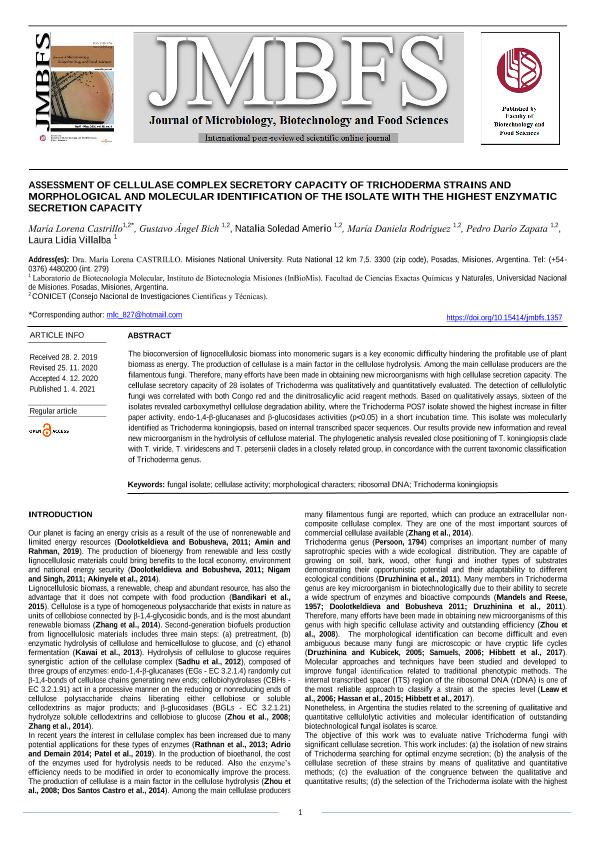Mostrar el registro sencillo del ítem
dc.contributor.author
Castrillo, María Lorena

dc.contributor.author
Bich, Gustavo Angel

dc.contributor.author
Amerio, Natalia Soledad

dc.contributor.author
Rodríguez, María Daniela

dc.contributor.author
Zapata, Pedro Dario

dc.contributor.author
Villalba, Laura Lidia
dc.date.available
2022-04-11T16:16:23Z
dc.date.issued
2021-04
dc.identifier.citation
Castrillo, María Lorena; Bich, Gustavo Angel; Amerio, Natalia Soledad; Rodríguez, María Daniela; Zapata, Pedro Dario; et al.; Assessment of cellulase complex secretory capacity of trichoderma strains and morphological and molecular identification of the isolate with the highest enzymatic secretion capacity; Slovak University of Agriculture. Faculty of Biotechnology and Food Sciences; Journal of Microbiology, Biotechnology and Food Sciences; 10; 5; 4-2021; 1-13
dc.identifier.issn
1338-5178
dc.identifier.uri
http://hdl.handle.net/11336/154920
dc.description.abstract
The bioconversion of lignocellulosic biomass into monomeric sugars is a key economic difficulty hindering the profitable use of plant biomass as energy. The production of cellulase is a main factor in the cellulose hydrolysis. Among the main cellulase producers are the filamentous fungi. Therefore, many efforts have been made in obtaining new microorganisms with high cellulase secretion capacity. The cellulase secretory capacity of 28 isolates of Trichoderma was qualitatively and quantitatively evaluated. The detection of cellulolytic fungi was correlated with both Congo red and the dinitrosalicylic acid reagent methods. Based on qualitatively assays, sixteen of the isolates revealed carboxymethyl cellulose degradation ability, where the Trichoderma POS7 isolate showed the highest increase in filter paper activity, endo-1,4-β-glucanases and β-glucosidases activities (p<0.05) in a short incubation time. This isolate was molecularly identified as Trichoderma koningiopsis, based on internal transcribed spacer sequences. Our results provide new information and reveal new microorganism in the hydrolysis of cellulose material. The phylogenetic analysis revealed close positioning of T. koningiopsis clade with T. viride, T. viridescens and T. petersenii clades in a closely related group, in concordance with the current taxonomic classification of Trichoderma genus.
dc.format
application/pdf
dc.language.iso
eng
dc.publisher
Slovak University of Agriculture. Faculty of Biotechnology and Food Sciences
dc.rights
info:eu-repo/semantics/openAccess
dc.rights.uri
https://creativecommons.org/licenses/by-nd/2.5/ar/
dc.subject
FUNGAL ISOLATE
dc.subject
CELLULASE ACTIVITY
dc.subject
MORPHOLOGYCAL CHARACTERS
dc.subject
RIBOSOMAL DNA
dc.subject.classification
Micología

dc.subject.classification
Ciencias Biológicas

dc.subject.classification
CIENCIAS NATURALES Y EXACTAS

dc.title
Assessment of cellulase complex secretory capacity of trichoderma strains and morphological and molecular identification of the isolate with the highest enzymatic secretion capacity
dc.type
info:eu-repo/semantics/article
dc.type
info:ar-repo/semantics/artículo
dc.type
info:eu-repo/semantics/publishedVersion
dc.date.updated
2021-07-30T18:52:10Z
dc.journal.volume
10
dc.journal.number
5
dc.journal.pagination
1-13
dc.journal.pais
Eslovaquia

dc.journal.ciudad
Nitra
dc.description.fil
Fil: Castrillo, María Lorena. Universidad Nacional de Misiones. Facultad de Ciencias Exactas Químicas y Naturales. Departamento de Bioquímica Clínica. Laboratorio de Biotecnología Molecular; Argentina. Consejo Nacional de Investigaciones Científicas y Técnicas. Centro Científico Tecnológico Conicet - Nordeste; Argentina
dc.description.fil
Fil: Bich, Gustavo Angel. Universidad Nacional de Misiones. Facultad de Ciencias Exactas Químicas y Naturales. Departamento de Bioquímica Clínica. Laboratorio de Biotecnología Molecular; Argentina. Consejo Nacional de Investigaciones Científicas y Técnicas. Centro Científico Tecnológico Conicet - Nordeste; Argentina
dc.description.fil
Fil: Amerio, Natalia Soledad. Universidad Nacional de Misiones. Facultad de Ciencias Exactas Químicas y Naturales. Departamento de Bioquímica Clínica. Laboratorio de Biotecnología Molecular; Argentina. Consejo Nacional de Investigaciones Científicas y Técnicas. Centro Científico Tecnológico Conicet - Nordeste; Argentina
dc.description.fil
Fil: Rodríguez, María Daniela. Universidad Nacional de Misiones. Facultad de Ciencias Exactas Químicas y Naturales. Departamento de Bioquímica Clínica. Laboratorio de Biotecnología Molecular; Argentina. Consejo Nacional de Investigaciones Científicas y Técnicas. Centro Científico Tecnológico Conicet - Nordeste; Argentina
dc.description.fil
Fil: Zapata, Pedro Dario. Universidad Nacional de Misiones. Facultad de Ciencias Exactas Químicas y Naturales. Departamento de Bioquímica Clínica. Laboratorio de Biotecnología Molecular; Argentina. Consejo Nacional de Investigaciones Científicas y Técnicas. Centro Científico Tecnológico Conicet - Nordeste; Argentina
dc.description.fil
Fil: Villalba, Laura Lidia. Universidad Nacional de Misiones. Facultad de Ciencias Exactas Químicas y Naturales. Departamento de Bioquímica Clínica. Laboratorio de Biotecnología Molecular; Argentina
dc.journal.title
Journal of Microbiology, Biotechnology and Food Sciences
dc.relation.alternativeid
info:eu-repo/semantics/altIdentifier/url/https://office2.jmbfs.org/index.php/JMBFS/article/view/1357
dc.relation.alternativeid
info:eu-repo/semantics/altIdentifier/doi/https://doi.org/10.15414/jmbfs.1357
Archivos asociados
